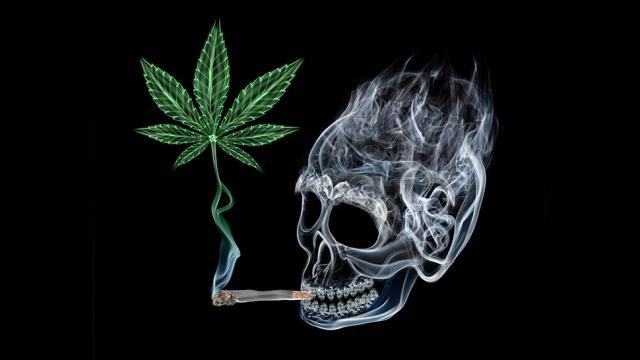Tetrahydrocannabinol, or THC, is the dopamine-boosting compound in marijuana that, technically speaking, “induces euphoria” — science jargon for “gets you high”. It also happens to work on the brain region involved in psychological addiction. Now, a team of researchers has identified a substance that blocks THC’s dopamine effect. Why is that important? Let’s have a grown-up discussion about weed.
We’ve already written about the mechanics behind how marijuana makes you feel. But you may be surprised to find out that in the United States, over a million people sought treatment for marijuana dependence in 2009 (Figure 7.8), nearly as many as did for cocaine and heroin combined. While the Marijuana Policy Project points out that 57 per cent of those receiving treatment in the US did so in lieu of serving a prison sentence, people still seek anti-dependence treatment in countries like the Netherlands where marijuana use has been decriminalised.
Like most drugs with addictive potential, THC works by increasing dopamine levels in the “reward centres” of the brain (the ventral tegmental area and the nucleus accumbens). A team led by researchers at the University of Maryland School of Medicine and the National Institute on Drug abuse found that the drug Ro 61-8048 blocks THC’s ability to stimulate dopamine production in the brain’s reward centres. Without dopamine, there’s no neurological reward to the drug, and no drive to continue using it.
The researchers taught squirrel monkeys to self-administer THC by pushing a lever. Once the monkeys exhibited signs of addiction (in this case, frequent lever pushing), Ro 61-8048 reduced the reward effect of continual THC doses, leading the monkeys to stop seeking additional doses. The same behaviour was seen in rats that were taught to dose themselves with WIN 55,212-2, a synthetic THC substitute.
But perhaps more importantly, the THC-blocking drug blocked relapse behaviour in the animal test subjects. Animals given THC after having been weaned off the drug quickly resumed their lever-pushing behaviour, while those treated with Ro 61-8048 exhibited no such relapse.
Unlike some other drugs, there is currently no medical treatment for psychological dependence on marijuana. While there are many necessary steps between this successful animal trial and effective human use, for people legitimately seeking help with a psychological addiction, this is a promising finding. Perhaps another application (albeit one the researchers didn’t bring up in this paper) could be for medical marijuana users who want the therapeutic benefits of the drug without it impacting their alertness or behaviour.
No matter how you view the debate over marijuana use, medical or otherwise, a deeper understanding of how it works is beneficial to everyone. The more we learn about the interaction between THC and the human brain, the better informed our personal, political and legal decisions about marijuana can be. [Nature Neuroscience via MedicalXpress]
Pictures: Stepan Kapl/Shutterstock
